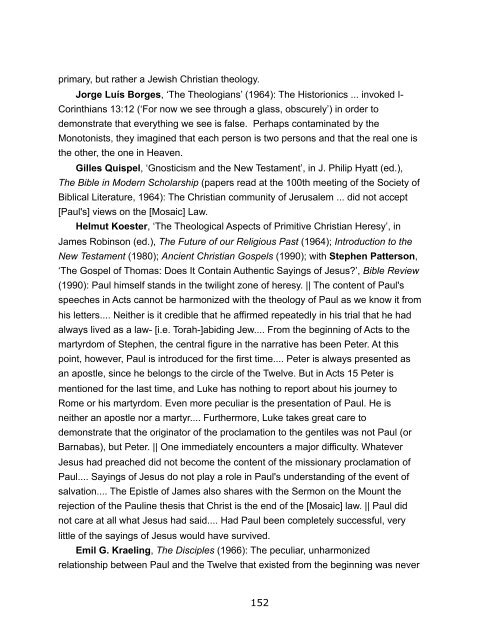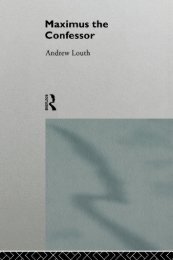Gospels of Thomas and Philip and Truth - Syriac Christian Church
Gospels of Thomas and Philip and Truth - Syriac Christian Church
Gospels of Thomas and Philip and Truth - Syriac Christian Church
You also want an ePaper? Increase the reach of your titles
YUMPU automatically turns print PDFs into web optimized ePapers that Google loves.
primary, but rather a Jewish <strong>Christian</strong> theology.<br />
Jorge Luís Borges, ‘The Theologians’ (1964): The Historionics ... invoked I-<br />
Corinthians 13:12 (‘For now we see through a glass, obscurely’) in order to<br />
demonstrate that everything we see is false. Perhaps contaminated by the<br />
Monotonists, they imagined that each person is two persons <strong>and</strong> that the real one is<br />
the other, the one in Heaven.<br />
Gilles Quispel, ‘Gnosticism <strong>and</strong> the New Testament’, in J. <strong>Philip</strong> Hyatt (ed.),<br />
The Bible in Modern Scholarship (papers read at the 100th meeting <strong>of</strong> the Society <strong>of</strong><br />
Biblical Literature, 1964): The <strong>Christian</strong> community <strong>of</strong> Jerusalem ... did not accept<br />
[Paul's] views on the [Mosaic] Law.<br />
Helmut Koester, ‘The Theological Aspects <strong>of</strong> Primitive <strong>Christian</strong> Heresy’, in<br />
James Robinson (ed.), The Future <strong>of</strong> our Religious Past (1964); Introduction to the<br />
New Testament (1980); Ancient <strong>Christian</strong> <strong>Gospels</strong> (1990); with Stephen Patterson,<br />
‘The Gospel <strong>of</strong> <strong>Thomas</strong>: Does It Contain Authentic Sayings <strong>of</strong> Jesus?’, Bible Review<br />
(1990): Paul himself st<strong>and</strong>s in the twilight zone <strong>of</strong> heresy. || The content <strong>of</strong> Paul's<br />
speeches in Acts cannot be harmonized with the theology <strong>of</strong> Paul as we know it from<br />
his letters.... Neither is it credible that he affirmed repeatedly in his trial that he had<br />
always lived as a law- [i.e. Torah-]abiding Jew.... From the beginning <strong>of</strong> Acts to the<br />
martyrdom <strong>of</strong> Stephen, the central figure in the narrative has been Peter. At this<br />
point, however, Paul is introduced for the first time.... Peter is always presented as<br />
an apostle, since he belongs to the circle <strong>of</strong> the Twelve. But in Acts 15 Peter is<br />
mentioned for the last time, <strong>and</strong> Luke has nothing to report about his journey to<br />
Rome or his martyrdom. Even more peculiar is the presentation <strong>of</strong> Paul. He is<br />
neither an apostle nor a martyr.... Furthermore, Luke takes great care to<br />
demonstrate that the originator <strong>of</strong> the proclamation to the gentiles was not Paul (or<br />
Barnabas), but Peter. || One immediately encounters a major difficulty. Whatever<br />
Jesus had preached did not become the content <strong>of</strong> the missionary proclamation <strong>of</strong><br />
Paul.... Sayings <strong>of</strong> Jesus do not play a role in Paul's underst<strong>and</strong>ing <strong>of</strong> the event <strong>of</strong><br />
salvation.... The Epistle <strong>of</strong> James also shares with the Sermon on the Mount the<br />
rejection <strong>of</strong> the Pauline thesis that Christ is the end <strong>of</strong> the [Mosaic] law. || Paul did<br />
not care at all what Jesus had said.... Had Paul been completely successful, very<br />
little <strong>of</strong> the sayings <strong>of</strong> Jesus would have survived.<br />
Emil G. Kraeling, The Disciples (1966): The peculiar, unharmonized<br />
relationship between Paul <strong>and</strong> the Twelve that existed from the beginning was never<br />
152




